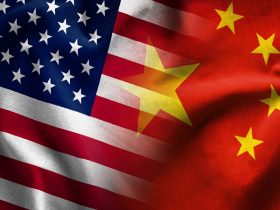
Putting U.S.–China relations back on a constructive path will be one of the top foreign policy challenges facing the Biden administration in 2021. I expect an almost immediate, modest improvement in the relationship, because I expect Biden to abandon the current administration’s approach of treating the Chinese government as an enemy.
Converting that into a systemic improvement in the relationship between the world’s two largest economies will be a far greater challenge, and will depend on how Xi Jinping views his country’s long-term role in the world. I expect U.S.–China relations to develop over three phases under the Biden administration.
Phase I: Changing rhetoric
I anticipate an almost immediate improvement in U.S.–China relations once Joe Biden moves into the White House on January 20. Phase I will be easy, as it will result from what Biden and his team do not say.
The current administration has demonized China, calling it an enemy and an existential threat to America. The Biden administration won’t say that, instead describing China as a competitor.
The current administration has advocated regime change in China. The Biden administration will not.
The current administration has cast the bilateral relationship in ideological terms. I expect the Biden administration to take a pragmatic approach.
This change in rhetoric will be important. Simply not calling China an enemy will take the chill off the relationship, creating space for both Biden and Xi to consider what concrete steps they’re willing to take. This may also comfort some investors, who may have felt recently that the language of the current administration raised the political risk of investing in Chinese equities and bonds.
Phase I may also include the reversal of some recent policies which are “own goals” — damaging to the American economy and society. One example would be the end of the current administration’s hostile rhetoric and policies towards foreign students, which has led to a sharp decline in the issuance of student visas.
Phase II: Space to develop a long-term strategy
A rhetorically warmer relationship will create opportunities for both Biden and Xi, but Phase II will likely develop slowly, as Biden will be focused on domestic health and economic issues.
I expect one of Biden’s first foreign policy initiatives will be an effort to reverse the current administration’s unilateralism. Part of rebuilding relationships with America’s allies and partners will involve consulting on China to develop a consensus on areas where democracies can work collaboratively with Xi (such as climate change, North Korea and health issues), as well as agreement on priorities that call for multilateral pressure on Beijing (civil rights, for example).
It is clear that other nations do not want Washington to force them to choose sides in a U.S.–China conflict, as the current administration has, in part due to economic realities. Last year, more than half of the U.S.’s North Atlantic Treaty Organization allies, as well as Japan, South Korea, Australia and New Zealand, did more trade with China than with the U.S.
And few, if any, of America’s allies and partners believe that they have the option to decouple from China, which accounts for a larger share of global economic growth than the U.S., Europe and Japan combined.
Most importantly, a less confrontational tone from Washington will give Xi an opportunity to decide if he, too, wants a collaborative and constructive relationship with the U.S. and its partners. Xi may take the opportunity to recall that the significant changes made by his predecessors who ran China during the decades when the bilateral relationship was characterized by “engagement”—everything from turning over most of the economy to market forces to granting significant personal freedom to most Chinese citizens—led to a better life for its citizens, a stronger global role for the country and domestic political support for the Chinese Communist Party.
Phase III: Concrete steps
Phase III will be the hard part, for both sides, and will probably develop even more gradually during the first two years of the Biden administration.
For Biden, a fundamental choice will be whether to turn away from the current administration’s stick-focused approach, including tariffs and sanctions, which has been costly to the U.S. economy and has failed to generate change in China, and instead return to the more carrot-based engagement approach that incentivized past Chinese leaders to adopt policies and practices more closely aligned with global norms.
Remember that over the past 40 years, engagement between the U.S. and China did lead to progress. Most Chinese people have a healthier and more comfortable life, and enjoy far greater personal freedom. Beijing has supported efforts to limit the spread of nuclear weapons, and to resolve the dispute on the Korean peninsula. While the Chinese government has clearly not lived up to all of its World Trade Organization commitments, it has done enough to enable General Motors Co. to sell more cars in China than in the U.S.
Most importantly, ending the demonization of China, and pursuing engagement in concert with U.S. allies and partners, especially in Asia, is the best way to make clear to Beijing that its policies and practices will have to continue to evolve towards global norms if China wishes to reach its full economic potential and take a more prominent role in regional and global institutions.
Engagement is certainly not guaranteed to succeed, but it does provide the best way to offer Beijing a clear choice. The alternative, which treats the Chinese government as an enemy, is almost certain to lead Beijing to behave that way, which would leave the U.S. less prosperous and less secure in the long run.
Andy Rothman is an investment strategist at Matthews Asia. These views are those of the author and not necessarily those of the Canadian Investment Review.
